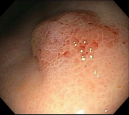Sunday Poster Session
Category: Stomach and Spleen
P2100 - Don’t Be Rash, Go With Your Gut: A Case of Exclusive GI Involvement of Kaposi Sarcoma in a Patient With Advanced HIV
Sunday, October 26, 2025
3:30 PM - 7:00 PM PDT
Location: Exhibit Hall
- PS
Priyanka Shah, MD
Lewis Katz School of Medicine at Temple University
Philadelphia, PA
Presenting Author(s)
Priyanka Shah, MD1, Lindsay A. Matthews, MD1, Zachary Wilmer. Reichenbach, MD, PhD2
1Lewis Katz School of Medicine at Temple University, Philadelphia, PA; 2Lewis Katz School of Medicine at Temple University, Coplay, PA
Introduction: Kaposi sarcoma (KS) is a vascular tumor associated with human herpesvirus 8 (HHV-8), which is associated with HIV. KS is most often found on the skin. In fact, only about 3.4-10% of cases present without cutaneous lesions. When there is GI involvement (GI-KS), patients may present with nausea, vomiting, abdominal pain, and/or GI bleed. Others may be asymptomatic. Here we describe the case of a patient with HIV who had asymptomatic GI-KS without any cutaneous lesions.
Case Description/
Methods: A 30 year old male with history of pancolitis status-post antibiotic treatment presented with oral thrush, abdominal pain, and bloody diarrhea. He was diagnosed with HIV. Stool studies were positive for shigella and cryptosporidium. Esophagogastroduodenoscopy (EGD) and flexible sigmoidoscopy were performed. EGD showed a single 15 mm protruding, sessile mucosal nodule in the gastric incisura. Pathology showed proliferation of spindle cells, staining positive for HHV-8, CD31, CD34, and ETS-related gene, all findings consistent with KS. Flexible sigmoidoscopy found diffuse friable, erythematous, ulcerated, and nodular mucosa that ultimately showed CMV colitis. Staging CT showed a 1.6 mm gastric nodule, though it was unclear if this was an artifact. No metastatic disease was found. The patient is undergoing treatment for the above infections and is on highly active antiretroviral therapy.
Discussion: Although GI-KS is not uncommon, there are only a few reported cases of exclusive GI involvement, such as in this patient. This case is also rare since this patient had no symptoms from the GI-KS, possibly since the lesion had not yet progressed. Therefore, this case gives us a valuable picture of how earlier-stage GI-KS appears endoscopically and histologically. It also suggests that screening endoscopies should perhaps be part of the standard of care for patients diagnosed with advanced HIV in order to diagnose GI-KS before further progression.
Imeh M, Gutierrez JO, Bhatija R, et al. Gastrointestinal Kaposi Sarcoma without Dermatological Lesions: A Case Report. Am J Case Rep. 2023;24:e941815. Published 2023 Dec 7. doi:10.12659/AJCR.941815
Schulberg S, Al-Feghali V, Bain K, Shehebar J. Non-cutaneous AIDS-associated Kaposi's sarcoma presenting as recurrent rectal abscesses. BMJ Case Rep. 2018;2018:bcr2018225749. Published 2018 Aug 20. doi:10.1136/bcr-2018-225749

Figure: Kaposi sarcoma in the gastric incisura
Disclosures:
Priyanka Shah indicated no relevant financial relationships.
Lindsay Matthews indicated no relevant financial relationships.
Zachary Reichenbach indicated no relevant financial relationships.
Priyanka Shah, MD1, Lindsay A. Matthews, MD1, Zachary Wilmer. Reichenbach, MD, PhD2. P2100 - Don’t Be Rash, Go With Your Gut: A Case of Exclusive GI Involvement of Kaposi Sarcoma in a Patient With Advanced HIV, ACG 2025 Annual Scientific Meeting Abstracts. Phoenix, AZ: American College of Gastroenterology.
1Lewis Katz School of Medicine at Temple University, Philadelphia, PA; 2Lewis Katz School of Medicine at Temple University, Coplay, PA
Introduction: Kaposi sarcoma (KS) is a vascular tumor associated with human herpesvirus 8 (HHV-8), which is associated with HIV. KS is most often found on the skin. In fact, only about 3.4-10% of cases present without cutaneous lesions. When there is GI involvement (GI-KS), patients may present with nausea, vomiting, abdominal pain, and/or GI bleed. Others may be asymptomatic. Here we describe the case of a patient with HIV who had asymptomatic GI-KS without any cutaneous lesions.
Case Description/
Methods: A 30 year old male with history of pancolitis status-post antibiotic treatment presented with oral thrush, abdominal pain, and bloody diarrhea. He was diagnosed with HIV. Stool studies were positive for shigella and cryptosporidium. Esophagogastroduodenoscopy (EGD) and flexible sigmoidoscopy were performed. EGD showed a single 15 mm protruding, sessile mucosal nodule in the gastric incisura. Pathology showed proliferation of spindle cells, staining positive for HHV-8, CD31, CD34, and ETS-related gene, all findings consistent with KS. Flexible sigmoidoscopy found diffuse friable, erythematous, ulcerated, and nodular mucosa that ultimately showed CMV colitis. Staging CT showed a 1.6 mm gastric nodule, though it was unclear if this was an artifact. No metastatic disease was found. The patient is undergoing treatment for the above infections and is on highly active antiretroviral therapy.
Discussion: Although GI-KS is not uncommon, there are only a few reported cases of exclusive GI involvement, such as in this patient. This case is also rare since this patient had no symptoms from the GI-KS, possibly since the lesion had not yet progressed. Therefore, this case gives us a valuable picture of how earlier-stage GI-KS appears endoscopically and histologically. It also suggests that screening endoscopies should perhaps be part of the standard of care for patients diagnosed with advanced HIV in order to diagnose GI-KS before further progression.
Imeh M, Gutierrez JO, Bhatija R, et al. Gastrointestinal Kaposi Sarcoma without Dermatological Lesions: A Case Report. Am J Case Rep. 2023;24:e941815. Published 2023 Dec 7. doi:10.12659/AJCR.941815
Schulberg S, Al-Feghali V, Bain K, Shehebar J. Non-cutaneous AIDS-associated Kaposi's sarcoma presenting as recurrent rectal abscesses. BMJ Case Rep. 2018;2018:bcr2018225749. Published 2018 Aug 20. doi:10.1136/bcr-2018-225749

Figure: Kaposi sarcoma in the gastric incisura
Disclosures:
Priyanka Shah indicated no relevant financial relationships.
Lindsay Matthews indicated no relevant financial relationships.
Zachary Reichenbach indicated no relevant financial relationships.
Priyanka Shah, MD1, Lindsay A. Matthews, MD1, Zachary Wilmer. Reichenbach, MD, PhD2. P2100 - Don’t Be Rash, Go With Your Gut: A Case of Exclusive GI Involvement of Kaposi Sarcoma in a Patient With Advanced HIV, ACG 2025 Annual Scientific Meeting Abstracts. Phoenix, AZ: American College of Gastroenterology.
